Lea Wait's Blog, page 10
July 15, 2025
Boatload of Books: A Deep Downeast Bookstore
During a recent trip to visit my husband’s family in Eastport, ME, I had the pleasure of losing some time in Boatload of Books, a bookstore that opened earlier this year. The bookstore is mixed in with vintage and art stores, a candy store, a coffee shop, and a stone’s throw from the Quoddy Tides office, Rosie’s Hotdogs, and the Tides Institute & Museum. If you want something a little more than a hotdog, the Waco never disappoints, you can swing by Phoenix Fine Wines for a glass of something chilled, or have a frosty beverage at Horn Run Brewery. If you haven’t made a trip to Eastport, it’s worth the car ride. (Or the boat, if you are coastal and seafaring.)
 Boatload of Books has a solid collection of crime fiction – including mystery periodicals like Alfred Hitchcock and Ellery Queen Mystery Magazines (which, as a lover of the short form, speaks to a certain piece of my soul). There are reading nooks and chairs, coffee and tea, and a room hidden behind a bookshelf that is very, very fun. For those of you who have kids along, there is a desk with child-friendly activities, allowing for a nice bookstore meander. From the reading nook at the front of the store, patrons can catch great views of people passing by and the pier.
Boatload of Books has a solid collection of crime fiction – including mystery periodicals like Alfred Hitchcock and Ellery Queen Mystery Magazines (which, as a lover of the short form, speaks to a certain piece of my soul). There are reading nooks and chairs, coffee and tea, and a room hidden behind a bookshelf that is very, very fun. For those of you who have kids along, there is a desk with child-friendly activities, allowing for a nice bookstore meander. From the reading nook at the front of the store, patrons can catch great views of people passing by and the pier.
Boatload’s owner, Christina Jeffrey, took some time out to answer a few of my questions for curious readers.
Why did you decide to open Boatload of Books?
 It’s been a desire since I was little to have my own bookstore. My grandmother taught me to read at 3 yrs. old and books became a haven during a mega dysfunctional upbringing. My first job was in a bookstore and then I went into special education, where literacy was the main focus. When I moved to Eastport, I knew there wasn’t a bookstore, but I figured there would be one nearby. I was clearly wrong. My sister came to visit and reminded me of my bookstore dreams and I ran with it.
It’s been a desire since I was little to have my own bookstore. My grandmother taught me to read at 3 yrs. old and books became a haven during a mega dysfunctional upbringing. My first job was in a bookstore and then I went into special education, where literacy was the main focus. When I moved to Eastport, I knew there wasn’t a bookstore, but I figured there would be one nearby. I was clearly wrong. My sister came to visit and reminded me of my bookstore dreams and I ran with it.
Why Eastport?
 I moved here a little over three years ago during circumstances that required a life change. During multiple visits and vacations, my husband and I fell in love with the community and the beauty of Eastport. Every city/town should have a bookstore. Our community needs this as much as I do, especially in the off season.
I moved here a little over three years ago during circumstances that required a life change. During multiple visits and vacations, my husband and I fell in love with the community and the beauty of Eastport. Every city/town should have a bookstore. Our community needs this as much as I do, especially in the off season.
What are some of the things you like about having the bookstore?
 I love when all the nooks and seats are occupied. Getting books, whether donated or purchased, is the best. Watching people find books that speak to them, seeing people actively seeking knowledge, and helping people access other worlds makes me really happy.
I love when all the nooks and seats are occupied. Getting books, whether donated or purchased, is the best. Watching people find books that speak to them, seeing people actively seeking knowledge, and helping people access other worlds makes me really happy.
Any books you’d recommend?
 Okay, so…I’m not a big crime reader. I know that’s a horrible thing to say to you. My suggestions stem from what I know my guests like to read and what looks interesting to me. I did read Agatha Christie and Nancy Drew a lot when I was younger. Nancy Drew’s books were what inspired my secret room of banned books at the store. I have just started a book by Tana French, The Searcher. So far it’s really good, but I’m reading in short stints between customers. I’m looking forward to winter when I’ll be able to read chapters at a time.
Okay, so…I’m not a big crime reader. I know that’s a horrible thing to say to you. My suggestions stem from what I know my guests like to read and what looks interesting to me. I did read Agatha Christie and Nancy Drew a lot when I was younger. Nancy Drew’s books were what inspired my secret room of banned books at the store. I have just started a book by Tana French, The Searcher. So far it’s really good, but I’m reading in short stints between customers. I’m looking forward to winter when I’ll be able to read chapters at a time.
What’s a perfect day in Eastport look like for you?
A perfect day in Eastport would be cool and foggy. I would have chill tunes playing in the background and a cup of hot lemon ginger tea in hand. The seats will all be filled with happy readers and chatters, and little kids will be playing in the mini bookstore. I’ll be reading poetry from a vintage book that I found in the bottom of a donation box.
Is there anything else you want people to know?
I am really passionate about the power of literacy. During the last few years, as things have grown increasingly difficult for so many, I’ve thought a lot about what I singularly can do to help or make a change. Reading and writing have a massive impact on society. This little bookstore is my contribution, not just to my community but to anyone who walks through the door.
***
If you happen to take a trip along the Bold Coast, be sure to stop in the Boatload of Books. If you live Downeast and love crime writing and horror, Boatload will be hosting an event that features writers from across this great state during the Witches of Eastport festival (10/25).
More details on this event soon.
As for some of my own writing updates:
[image error]You can find my story “The Usual Reasons” in the latest Ellery Queen Mystery Magazine, available online or on the shelves at Barnes and Noble, Books a Million, and select local bookstores.
My story “For Laura” appears online for Stone’s Throw from Rock and a Hard Place Press. You can read it here. All the stories will be collected at the end of the year in a print anthology, too.
Carol Goodman Kaufman and I sat down to talk for her podcast “Murder We Write.” You can listen here.
My short story “Vacationland,” which was included in the Dark Waters Anthology Volume 2, made the Most Distinguished for the Best American Mystery Stories. You can buy a copy of the anthology here.
Finally – for my New England crime and horror writers – be sure to register for Crime Wave (more here) and Crime Bake (more here). Can’t wait to see you around!
Be well,
Gabi
July 13, 2025
THE PIG FARM
Due to a two-week hiatus in which I had no internet, I have not been able to post a new post. I have taken the liberty of reposting one I did five years ago. It was about a man who was the inspiration for my book, THE FISHERMAN.
The Pig FarmerPosted on March 5, 2020 by Vaughn C. Hardacker

Vaughn
Vaughn C. Hardacker here: In her blog of February 21st, 2020, Kate Flora discussed the question every writer is asked at one time or another: “Where do you get your ideas?” Well, we get them from a lot of places. The idea for my second novel, The Fisherman, came from a pig farmer.
Obviously, this requires some explanation. In 2000, I was working as an instructor teaching sales people throughout the world about Wide Area Network equipment. When I told my wife that I was scheduled for a trip to Vancouver, British Columbia, she wanted to go with me–her father was Canadian and she had always wanted to visit there. The trip was great. So you may ask, “That’s nice, but where did you get the idea for your book?”
One evening, shortly after our return, I was in my office banging away on the manuscript for Sniper when she came in and showed me an article she had found. She said, “You could write a book about this. Here is what she showed me:
Robert Pickton: The Pig Farmer Serial Killer from Canada Who Confessed to 49 MurdersDozens of women met a gruesome end on Pickton’s isolated property.
In 2007, Robert William “Willy” Pickton was convicted of murdering six women and sentenced to life in prison, without the possibility of parole for 25 years—the longest sentence that he could possibly receive at the time. He was charged with the deaths of many more—and, while in prison, admitted to an undercover officer that he had killed 49 women, and that he wanted to bring that number up to “an even 50.”
The details of Robert Pickton’s crimes—which included the discovery of human remains in trash cans, feeding bodies to his pigs, and possibly even selling human flesh mixed with pork for public consumption—shocked the country and the world, and were uncovered by one of the largest serial killer investigations in Canadian history.
Who Is Robert Pickton?
Before he became known as one of Canada’s most prolific serial killers, Robert Pickton was described as a “pretty quiet guy” who, along with his brother, owned a pig farm in British
Robert Pickton
Columbia. A worker on the farm later called it a “creepy-looking place,” and in 1998, the brothers were sued by the local government over zoning ordinance violations for neglecting the property and turning one of their slaughterhouses into an event venue.
In 1996, the two brothers had registered a nonprofit organization called the “Piggy Palace Good Times Society”—a disturbing name, in hindsight. Its stated aims were to “organize, coordinate, manage, and operate special events, functions, dances, shows, and exhibitions on behalf of service organizations, sports organizations, and other worthy groups.”
In practice, the farm played host to a variety of raves and wild parties which were held in a converted slaughterhouse. Among those known to frequent the parties held at the Picktons’ farm were sex workers from Vancouver and members of the Hells Angels motorcycle club. In 1998, the Picktons were served with an injunction banning any future events on the premises, and their nonprofit status was revoked the following year.
Robert Pickton’s First Encounter with Law Enforcement
Five years before he was arrested and charged with murder, Robert Pickton was faced with another charge—the 1997 attempted murder of sex worker Wendy Lynn Eistetter, who informed police that Pickton had solicited her services and brought her to the farm. There, he handcuffed her left hand and stabbed her in the abdomen.
The Pickton Pig Farm
Eistetter managed to escape, disarming Pickton and stabbing him with his own weapon. At the hospital where both were treated, hospital staff used a key found in Pickton’s pocket to unlock the handcuff on Eistetter’s wrist. The attempted murder charge was eventually dropped, reportedly because prosecutors believed that Eistetter’s ongoing drug use made her an unreliable witness.
Pickton’s clothes and rubber boots were seized by police during the initial arrest and kept in a storage locker for more than seven years. They weren’t tested for evidence until 2004, when they were swabbed for DNA and found to be a match for two missing women.
The Arrest of Robert Pickton
From 1983 to 2002, more than 60 women disappeared from Vancouver’s Downtown Eastside, an impoverished community. It was an ongoing crisis that seemed to have no end in sight, although Pickton had been on the police’s radar for quite a while. In February of 2002, police finally searched the Pickton farm in an unrelated search for illegal weapons.
Both Robert Pickton and his brother were arrested, and the police obtained enough evidence for a second warrant in relation to the ongoing investigation into Vancouver’s missing women. While the two brothers were ultimately released, Robert Pickton was kept under surveillance and arrested again not long after, charged with two counts of first degree murder.
During their initial search, police had found personal items belonging to some of the missing women. Once Pickton was behind bars, the charges began to stack up. First three more charges were added. Then four. Then more and more, until Pickton had accrued a total of 27 first degree murder charges.
Robert Pickton’s Grisly Crimes
The details of Robert Pickton’s heinous crimes were under a publication ban for nearly a decade, and so it wasn’t until after the ban was lifted in 2010 that the extent of Pickton’s depredations became public knowledge. When they did, a grim and terrifying picture came into focus.
Pickton was linked to murders stretching back as far as 1991—long before his arrest for the attempted murder of Wendy Lynn Eistetter, and continuing for many years after the altercation. Police had found a variety of human remains on the farm, many of which were difficult to identify because they had been left to rot or fed to the hogs.
Among the grisly effects described in Pickton’s eventual trial were human skulls that had been cut in half with hands and feet stuffed inside, night vision goggles, human remains stored inside garbage bags, “Spanish fly” aphrodisiac, and a loaded revolver with a dildo attached to the barrel, which Pickton later claimed was used as a makeshift silencer. Investigators also found more than 80 unidentified DNA profiles on the property.
Robert Pickton’s Trial and Aftermath
Robert Pickton was ultimately tried and found guilty of six counts of second degree murder. The other 21 charges were stayed for a later date, but never tried, as Pickton had already received the maximum possible sentence.
The trial brought to public attention a number of missed opportunities for the police to investigate Pickton sooner and put an end to his killing spree. Besides his arrest for the attack on Wendy Lynn Eistetter, there had been several other attempts to bring Pickton’s activities to the attention of the authorities. According to Vancouver police detective constable Lorimer Shenher, the police had received a call to an anonymous tip line in 1998, indicating that Pickton should be investigated in relation to missing women in the area. In 1999, authorities received another tip, stating that Pickton had a freezer filled with human remains on his property.
Pickton was interviewed following the 1999 tip, and police obtained his consent to search the farm, but the search was never conducted. In 2004, before Pickton’s trial had even begun, the government issued a warning that Pickton may have ground up human flesh and mixed it with pork that he sold to the public.
During a press conference in 2010, Deputy Chief Constable Doug LePard issued an apology to the families of the victims. “I wish that all the mistakes that were made, we could undo,” he said. “And I wish that more lives would have been saved. So, on my behalf and behalf of the Vancouver Police Department and all the men and women who worked on this investigation, I would say to the families how sorry we all are for your losses and because we did not catch this monster sooner.”

The Fisherman
The case intrigued me. I always wondered why cadaver-sniffing dogs found nothing when they were utilized. At a Sisters In Crime meeting on Cape Cod, the guest speaker was a former K-9 officer from NYC, currently the police chief of Wellfleet, Massachusetts. I asked him about it, withholding the fact that it was a pig farm. His first question was just that: “What type of farm was it?” I filled in the blank. I was shocked when he told us: “Cadaver-sniffing dogs are trained to detect a body that has not been embalmed. They cannot be used in two places: Jewish cemeteries and pig farms. The Jewish do not embalm their dead–the dog believes everyone buried in the cemetery is a murder victim.” He went on to say “There is something in pig excrement that smells like a body to the dog.”
I wanted my antagonist to be living on the coast of Maine and didn’t think that a pig farm in Kennebunkport would work. Pickton disposed of his victims by feeding their remains to his pigs; my guy, Willard Fischer, ground his up for use as chum. Once I had the premise everything else was academic. It sure makes one believe the old adage: “The truth is stranger than fiction.”
Note: In 2016, a book called Pickton: In His Own Words went up for sale on Amazon. While the 144-page book’s author was listed as Michael Chilldres, it was actually a hand-written manuscript that Pickton had smuggled out of prison. Chilldres had simply typed it up and added his byline. Pickton maintained his innocence in the book, which was eventually pulled down by both the publisher and Amazon after a public outcry. “It’s his kind of shenanigans,” the father of one of the victims told CTV News in the wake of the furor over the book’s publication. “The guy never goes away.”
My new website, developed by Melissa Gerety of MSG Creative in Orono, ME, is live at https://vaughnhardacker.com. Stop by and let me know what you think.
July 11, 2025
Weekend Update: July12-13, 2025
 Next week at Maine Crime Writers there will be posts by Vaughn Hardacker (Monday), Gabi Stiteler (Tuesday), Rob Kelley (Thursday), and Kaitlyn Dunnett/Kathy Lynn Emerson (Friday).
Next week at Maine Crime Writers there will be posts by Vaughn Hardacker (Monday), Gabi Stiteler (Tuesday), Rob Kelley (Thursday), and Kaitlyn Dunnett/Kathy Lynn Emerson (Friday).
In the news department, here’s what’s happening with some of us who blog regularly at Maine Crime Writers:
 All Kathy Lynn Emerson’s reissued titles are on sale (25% off) in e-book format for the entire month of July at Smashwords. This includes all four Face Down Collections, other omnibus editions, and the single title childrens’ books and mystery stand alones. To see the complete list, click here: https://www.smashwords.com/profile/view/Kathy_LynnEmerson
All Kathy Lynn Emerson’s reissued titles are on sale (25% off) in e-book format for the entire month of July at Smashwords. This includes all four Face Down Collections, other omnibus editions, and the single title childrens’ books and mystery stand alones. To see the complete list, click here: https://www.smashwords.com/profile/view/Kathy_LynnEmerson
Kate Flora and Maureen Milliken will have a table at the Women Owned Business Market 1-4 p.m. Saturday, July 19, in the Beer Garden at Sidereal Farm Brewery, 37 Sidereal Way, Vassalboro. Besides mystery novels by two of Maine’s award-winning crime writers, the event will also feature jewelry, art, crafts and more.
Matt Cost will be giving a COST TALK on The Not So Merry Adventures of Max Creed at 6:30 PM on Wednesday, July 16 at the Readfield Community Library in Readfield, ME.
Matt Cost will be signing books at Shermans Maine Coast Bookshop on Saturday, July 19 from 1-3 PM in Freeport, ME.
An invitation to readers of this blog: Do you have news relating to Maine, Crime, or Writing? We’d love to hear from you. Just comment below to share.
And a reminder: If your library, school, or organization is looking for a speaker, we are often available to talk about the writing process, research, where we get our ideas, and other mysteries of the business, along with the very popular “Making a Mystery” with audience participation, and “Casting Call: How We Staff Our Mysteries.” We also do programs on Zoom. Contact Kate Flora
Let’s Talk Some More About AI

Over the 4th of a July I spent the time in the hills of New Hampshire, biking through the woods and enjoying being outside. Despite a deadline for a book that needed to be edited, I put everything aside to enjoy nature to its fullest.
All around me I saw signs of natural intelligence and it made me think of AI and the current state of writing.
Let’s have a talk about AI. Do you use it any capacity in your writing? In query’s to agents or creating a synopsis of your novel. Do you submit chapters into ChatGPT and ask for feedback? If so, you are using AI in your writing.
Have I done it? Yes, I’ve done it. Have I had reservations about using AI to assist me with my writing? By all means. It doesn’t feel ‘natural’ to me, despite it being an incredible tool that helps me hone my craft. It has also saved me a lot of time. Where I draw the line with AI is having it write, or rewrite, parts of my novel. I just can’t go there yet. But writers have used it in that way. In more than one example a writer, and publisher, has left an AI prompt in the middle of their novel, angering readers.
What do publishers think of writers using AI in their writing? Penguin Random House’s view on AI is murky. While the publisher promotes human creativity and intellectual property, it also says “we will use generative AI tools selectively and responsibly, where we see a clear case that they can advance our goals.” Hachette UK frowns upon machine creativity but advocates for “responsible experimentation with AI for operational uses”while also appreciating “the benefits of remaining curious and embracing technology.”
What is our responsibility to the reader? To simply put out the best product regardless of how it’s made? Or do we need to advise the reader how much of our work product was aided and assisted by AI? These are questions that are as complex as they are confusing.
As helpful as AI is as a tool to us writers, I must admit that this technology scares the hell out of me. But should it? I’m sure future generations will have no problem embracing it. More probable, however, is the fact that AI in the future will be solely responsible for writing books, creating music and making movies. I hate fretting about this development because the cat’s out of the bag and never going back. And with the advent of quantum computers, which will be a million times faster, AI will get much better at drawing from all sources to create something marketable and entertaining.
The reality is that computers don’t think. They gather up existing information and use it to synthesize. Humans think and that might be the one thing that gives me hope for the future. To quote Alva Noe, a philosophy professor at the University of California, “If there is intelligence in the vicinity of pencils, shoes, cigarette lighters, maps or calculators, it is the intelligence of their users and inventors. The digital is no different.”
For now, I’m using AI as a tool to help me become a better writer, but I’m drawing the line at letting it actually do the hard work of creating a story out of thin air.
July 10, 2025
DISTRACTION WARNING
July Blog 2025
Jule Selbo

I’ve been beating myself over the head lately because I’m so distracted with what’s going on in the world. Yeah, hard to ignore. That chapters that I would “normally” write, rewrite and rewrite again and then hopefully polish are getting rewritten five more times than normal – because I’m ‘not in the zone’.
The zone I am in is DISTRACTION.
I think I spent a whole week last month watching ALL CREATURES GREAT AND SMALL (the original series (1978-1980, BBC, based on James Herriot books). Morning. Afternoon. Night. Total binge.
Not my usual fare – feel good melodram-edy with little plot, way too likeable characters (can people be this kind and respectful?) and lots of rolling, remote English countryside. But I think I needed (knew I needed) to live where life was simpler, where people were kind, where they cared about each other – and for the cow and sheep in distress.
I even wrote a 10-minute play called DISTRACTION WARNING. There’s a group called Crowbait that meets the first Sunday night of every month at the Footlights Theatre in Falmouth. (The group has been around Portland for years, in different locales, it was created by April Singley-Masters, Cullen T.M. McGough, and Michael Tooher. They conceived the idea late one night at a bar, lamenting the lack of local playwrights being produced.)
Who attends Crowbait regularly? Doctors, engineers, theatre lovers, students, actors, writers, musicians, techies, retirees from different professions, baristas, construction workers, well-heeled and low-heeled folks who pay the ten buck entry fee (to cover rental of space). Those who feel like doing some writing, show up with a 10-minute play (about 5 pages of mostly dialogue). There is a prompt given every month, some people write to that, others write about whatever else is on their mind.

The names of the playwrights get put into a bag or sorting “hat”. The names of those who want to be among the acting pool that night get put into another “hat”. Each meeting night will feature 10 plays. If your play is pulled out of the hat, you dip your hand into the actor hat and randomly choose the cast. Genders/age/the ‘right’ casting for a role makes no difference. At one meeting I had a fifty-year-old man playing a ten-year-old girl and two thirty-year-old guys playing teenage ballerinas.
Maybe some of you readers have participated (in Maine or other places, one of the co-founders moved to the UK so it’s there too) and know that it’s all ‘cold readings’. Meaning that the actors have had no chance to read the short play ahead of time – they don’t know their character or the beginning, middle or end of the play. The author gets two minutes to tell them if it’s a comedy or drama and “the point” of the play (if the author even knows it) and one or two salient tips. That’s it.
Sometimes the casting works. Sometimes it doesn’t. That’s the beauty/looseness of it. Some of the writers are first-timers, some are doing silly send-ups, some are working on craft.

FUN RULES: If the play goes over the strict ten-minute limit, it’s BUZZED down by a guy with a duck whistle. If the play goes over ten minutes, it’s not eligible to be considered for any prizes (which might be a Snickers and a package of gum).
People come to see each other (great community), to laugh, to get a chance to act or have their words/ideas/stories presented. To be distracted.
The play I wrote for last Sunday’s Crowbait was about a novelist who couldn’t write the last chapter of his book. Fear. Worry. Self-doubt. Avoiding judgments he was sure to come. So, he took a job writing the Warning/Caution labels on drugs.
 You know things like – “Opepoflux users are at increased risk of ketoacidosis, dehydration, high blood pressure, high cholesterol, nasal spew, eye twitching, flop sweat, confusion, anxiety, serious infections in the urinary tract and BoBo’s gangrene…” etc. That kind of thing. He becomes the favorite of the Surgeon General. He totally distracts himself with writing pessimistic harbingers of possible doom. He’s become obsessed, he’s not paying attention to his young child or wife (who fell in love with a risk-taking, deep-thinking author and know who is he?). The family is falling apart –
You know things like – “Opepoflux users are at increased risk of ketoacidosis, dehydration, high blood pressure, high cholesterol, nasal spew, eye twitching, flop sweat, confusion, anxiety, serious infections in the urinary tract and BoBo’s gangrene…” etc. That kind of thing. He becomes the favorite of the Surgeon General. He totally distracts himself with writing pessimistic harbingers of possible doom. He’s become obsessed, he’s not paying attention to his young child or wife (who fell in love with a risk-taking, deep-thinking author and know who is he?). The family is falling apart –

Why did I write it? Where did the idea come from? I know it was a warning to me. That I wrote the silly play to get my mind back on the work I really care about. Telling me to not be distracted SO much.
July 8, 2025
Are You An Elevator?

Reid helping with the great 2024 clean-up
John Clark, semi-piggybacking on Kate’s post about growing up on Sennebec Hill Farm last week. One aspect of being a writer is the constant flow of thoughts that run through my (and hopefully your) mind. Last week, they took an interesting turn, inviting me to hover outside myself and ponder how even the most simple utterance or deed can create one of those better than average ripples in the pond of life.
It started when I watched two of my three grandchildren help us plant stuff in the garden. First off, it was soon to be five year old Reid helping me plant pole beans behind the garage. I poked the holes and he dropped seeds into them. A week later, it was even sooner to be five year old Gemma helping us plant broccoli. In both instances, Beth and I held back any orders or corrections, letting each child participate in their way. Reid’s beans are now beginning to climb through strands of string on their way to bearing pods while Gemma’s efforts are growing just as nicely.

Reid’s Beans
I remember Judi Redding, a very wise family therapist saying at a workshop on family systems many years ago that the three words kids hear the most while growing up are “no, don’t, and stop!”
Unlearning the instinct to use those admonishments and let kids feel a part of the bigger world around them is challenging, particularly when that’s how you grew up, but I am doing my best to back off as well as encouraging all three of my grandkids to feel like they’re an important part of our immediate world.
Last summer we took Piper, then age ten, on a Road Scholar grandparent/grandchild week in Virginia where we learned hands-on about marine life and ecology as well as seeing the wild ponies up close. Next month, we’re taking her to a working ‘rope and ride’ ranch outside Tucson, Arizona on a similar Road Scholar adventure. Every time I watch my grandchildren involved in a family activity, I flash back to when I was their age. My experiences were different, partly out of necessity. We grew up on a poultry farm and times were often hard. I was more pressed into service without explanation than invited to become a part of the family operation. There were exceptions, like the annual bean factory event where we, and often friends or summer guests, snipped, snapped, washed and packed fresh beans in canning jars.
Beth and I bought the half acre lot behind our house last year, for privacy and to avoid a house being built there. It was full of brush, fallen limbs and downed trees that were in varied stages of decay. After I’d cut up as much as I could, we rented a 30 cubic yard dumpster to haul it away. On the day we had a family cleanup party, Piper, Gemma, and Reid all did themselves proud, carrying whatever they could to the dumpster where the adults thanked them and added their contributions to the pile.
Last weekend, everyone got together to erect and enjoy a slack line that included various climbing apparati. Reid and Gemma kept busy chopping some of the huge crop of jewel weed that has overtaken the back property. I’m slowly weeding it by hand (my OCD tendency to count how many weeds I’ve pulled in each session (upwards of fourteen thousand at present), and their knocking it all over slightly complicates my cleanup. However, watching two almost five year olds merrily hoeing and hacking, is a most satisfying sight.

Last Saturday at Kate’s cottage in Harpswell, the family gathered again with Reid and Gemma having a delightful time with their cousin Robbie, a personal trainer who is as much a kid at heart as they are. Between finding perfect little pinecones to to toss into the ocean and making a sand and rock castle with a plastic pail of crabs as guardians, it was a most enjoyable family event.
There’s no way to protect their generation from the evil being inflicted by those in power, but we can make certain that they, and others we encounter on a daily basis, feel involved in things that are nurturing and mind healing, hopefully creating good memories to get them through dark moments.
July 6, 2025
Summer and Fall Opportunities
Summer is here, the season of long days, beautiful sunsets, strawberries with breakfast, lunch and dinner and blueberry season ahead. I’m doing my best to ignore the heat dome, the humidity index and all of the rainy Saturdays. Soon we’ll be on vacation, two precious weeks when I’ll have hours each day to write. A decade ago, it was relatively easy to switch from my lawyer to my writer brain after working all day. For a variety of reasons, that’s less true now.

A stunning summer sunset.
As I’ve made peace with my slower process, I’ve come to treasure all the more the summer weeks when I can immerse myself in writing, fueled by blueberry pie and punctuated by icy plunges into the sharp, salty, sea. I have three works in process right now—two short stories and a novel-in-process that’s it’s time to revisit—and I’m eager to get to work.
As newspaper editor Bernie O’Dea is fond of saying in the Maine Literary Award-winning novel DYING FOR NEWS by MCW’s own Maureen Milliken, I’m going to move forward like a shark. Many thanks for that inspiring mental image, Mo.
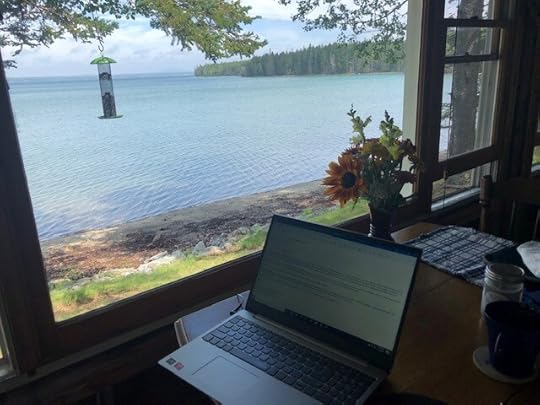
My summer vacation writing spot.
**
In no way do I want to rush the season, but two conferences are coming up this fall that readers of this blog won’t want to miss.
Maine Crime Wave has been moved from the spring, where it tended to collide with many other events, to September 27, and from the USM campus to Mechanics’ Hall in downtown Portland.
As MCW emeritus Barbara Ross blogged on May 27 (go here: https://mainecrimewriters.com/2025/05/27/what-happened-to-crime-wave ) Crime Wave 2025 will focus on building and connecting the crime writing community. The planning committee has designed a conference that’s far more interactive than in the past, with roundtables for discussion, more craft workshops, and a couple of special events on the Friday afternoon and evening before the conference itself.
At 4 p.m. Friday there’ll be a group tour of the Maine Historical Society’s exhibit NOTORIOUS: MAINE CRIME IN THE PUBLIE EYE, 1690 – 1940, which promises to be spectacular. Here’s the link for more info. https://www.mainehistory.org/all-exhibitions/notorious-maine-crime-in-the-public-eye/
Also on Friday, at 7:00 p.m., Novel, the book bar and café on Congress Street, will host NOIR @ THE BAR, where crime writers will read from their work in what is sure to be an uproarious, wonderful event. Novel is just down the block from Mechanics’ Hall, and more information is here: https://www.novelmaine.com/
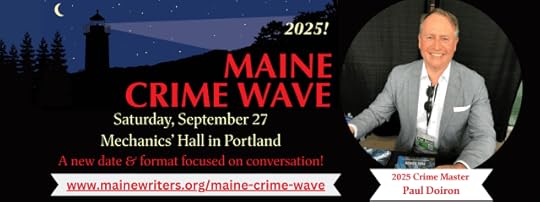
As for Saturday’s events, Paul Doiron, author of the award-winning Mike Bowditch series, is 2025 Crime Master. Julia Spencer-Fleming, author of the award-winning Rev. Clare Fergusson and Russ Van Alstyne mystery series, will interview Paul during the lunch hour. That discussion alone will be worth the price of admission, but the entire day will be packed with interesting conversations and opportunities to connect with Maine Crime Writers of all sorts.
Crime Wave includes a flash fiction contest open to all comers. The deadline to enter is August 1. The challenge is to write 500 words with the following opening line, devised by Paul: “The first recorded incident of cannibalism in Maine occurred in 1710 at Boon Island. The most recent incident was discovered last week.”
Inspired? Send your best work . . .
More details are on the Crime Wave website. The full schedule is here: https://www.mainewriters.org/events/crime-wave-schedule-2025 and the registration link is here: https://mainewriters.app.neoncrm.com/np/clients/mainewriters/eventRegistration.jsp?event=941&%20%20
**
On the weekend of November 7 – 9, New England Crime Bake will take place outside of Boston. A large contingent of Maine crime writers attends each year, along with folks from all over New England as well as other parts of the country.
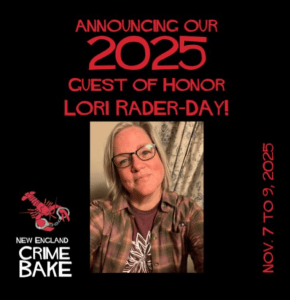
Lori Rader-Day, a marvelous writer and wonderful human being, is 2025 Guest of Honor. She’ll be launching her newest book, WRECK YOUR HEART, in early winter, so Crime Bake will offer the opportunity to hear from Lori about its protagonist, an up-and- coming country musician from her hometown of Chicago. You’ll als0 have a chance to do a some boot scooting to a live band at the Saturday evening banquet.
The aforementioned Barbara Ross, renowned not only for her writing but for her consistent support for other crime writers, will be awarded the Lifetime Achievement Award at the Saturday evening’s banquet. 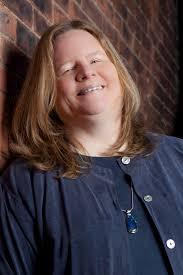 Barb is also teaching a on Friday afternoon a Master Class called “What I’ve Learned.” If you’ve ever heard Barb speak, you know it will be (1) inspiring and (2) hilarious.
Barb is also teaching a on Friday afternoon a Master Class called “What I’ve Learned.” If you’ve ever heard Barb speak, you know it will be (1) inspiring and (2) hilarious.
As a craft-focused conference, Crime Bake offers all kinds of opportunities to plug in with the region-wide crime writing community, and one of us probably will preview it again as summer moves to fall.
But don’t wait for that! This conference tends to sell out, so if you’re interested, this is the time to sign up. The full schedule is here: https://www.crimebake.org/event/b37885aa-3475-44c8-80a2-3a16206ce929/schedule
and here’s the link to register: https://www.crimebake.org/event/b37885aa-3475-44c8-80a2-3a16206ce929/regProcessStep1
Brenda Buchanan sets her novels in and around Portland. Her three-book Joe Gale series features a contemporary newspaper reporter with old-school style who covers the courts and crime beat at the fictional Portland Daily Chronicle. Brenda’s short story, “Means, Motive, and Opportunity,” was in the anthology Bloodroot: Best New England Crime Stories 2021 and received an honorable mention in Best American Mystery and Suspense 2022. Her story Assumptions Can Get You Killed appears in Wolfsbane: Best New England Crime Stories 2023. In 2025 she is staying busy with new projects.
July 4, 2025
Weekend Update: July 5-6, 2025
 Next week at Maine Crime Writers there will be posts by Brenda Buchanan (Monday), John Clark (Tuesday), Jule Selbo (Thursday), and Joe Souza (Friday).
Next week at Maine Crime Writers there will be posts by Brenda Buchanan (Monday), John Clark (Tuesday), Jule Selbo (Thursday), and Joe Souza (Friday).
In the news department, here’s what’s happening with some of us who blog regularly at Maine Crime Writers:
 Kate Flora is thrilled that she’s a finalist for the Claymore Award for her police procedural The Darker the Night
Kate Flora is thrilled that she’s a finalist for the Claymore Award for her police procedural The Darker the Night
Find Us in Readfield on the 10th!
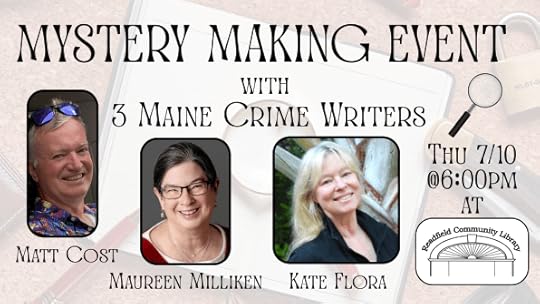
Matt Cost kicks back into high gear on the 10th for a busy finish to July. On that day he will be at the Readfield Community Library in Readfield, Maine, with Kate Flora and Maureen Milliken, making a mystery with audience participation, starting at 6 p.m.
On Friday, July 11th, Cost will be signing and selling books at the Second Friday in Brunswick, Maine, from 4-7 p.m.
On Wednesday, July 16th, he will be back at the Readfield Community Library at 6:30 p.m. giving a COST TALK on the Evolution of a Book with an emphasis on The Not So Merry Adventures of Max Creed.
On Saturday, July 19th, Cost will be signing books at Shermans Maine Coast Bookshop in Freeport, Maine, from 1-3 p.m.
On Sunday, July 20th, at 1 p.m., he will be at East Madison Days in East Madison, Maine, giving a COST TALK on the Evolution of a Book with an emphasis on The Not So Merry Adventures of Max Creed.
On Wednesday, July 23rd, he will be at the Shaw Public Library in Greenville, Maine, giving a COST TALK on the Evolution of a Book with an emphasis on The Not So Merry Adventures of Max Creed.
On Saturday, July 26, Cost will be at the Grand Opening of Books-A-Million in Auburn, Maine, signing books from 1-2:30.
On Sunday, July 27th, Cost will be selling and signing books at the Lakes Inn Book Festival in Belgrade, Maine, from 10-2 p.m.
On July 31st, Cost will be doing an interview for WABI TV 5 out of Bangor, Maine.
 Most of Kathy Lynn Emerson’s e-book titles are on sale at 25% off at Smashwords for the entire month of July. Check out what’s available here: https://www.smashwords.com/profile/view/Kathy_LynnEmerson
Most of Kathy Lynn Emerson’s e-book titles are on sale at 25% off at Smashwords for the entire month of July. Check out what’s available here: https://www.smashwords.com/profile/view/Kathy_LynnEmerson
An invitation to readers of this blog: Do you have news relating to Maine, Crime, or Writing? Are there topics you’d like to see us write about? We’d love to hear from you. Just comment below to share.
And a reminder: If your library, school, or organization is looking for a speaker, we are often available to talk about the writing process, research, where we get our ideas, and other mysteries of the business, along with the very popular “Making a Mystery” with audience participation, and “Casting Call: How We Staff Our Mysteries.” We also do programs on Zoom. Contact Kate Flora
July 3, 2025
Remembering Summers Past
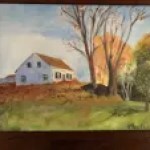
The farmhouse on Sennebec Hill, painting by Karin Rector
Kate Flora: Starting another Maine summer always makes me nostalgic for the summers of my youth. Yes, it’s true that we always think we are eighteen forever, unless it’s twenty-seven, but now I’m at the stage of life where I can say things like, “It’s been sixty years since I got my driver’s license” or “Was that really half a century ago?”
Recently, I was clearing out a box that had come out of my mother’s attic, and I found my old prom dresses. There was the one that I made from upholstery fabric that I took to 4-H state dress review. A pink satin dress with a wide white tie at the waist. A purple one that I think I wore to a prom in Camden. My school was too small to have a prom. Sewing was something I was always doing. My mother, who was clever (and we didn’t have any money) would always say, when I admired some piece of clothing in a store, “You can make that more cheaply.” I don’t think my taste was very good, as I remember making an orange vest and straight skirt that I wore with a purple blouse.
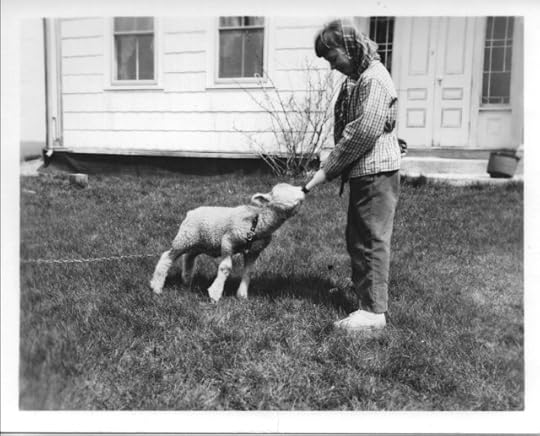
Sheep farmer Kate
Wrap-around skirts were also one of my summer projects. The summer I was taking driver’s ed, the teacher required all the girls to wear skirts, so I made one that I could wrap over my shorts. Unfortunately, I used to put it on just before I got in the car, which I am sure she resented. In any case, I know that she hated me. And that rattled me so much that when I took my driver’s test, I bumped the car behind me while parallel parking. I did get it on the second try.
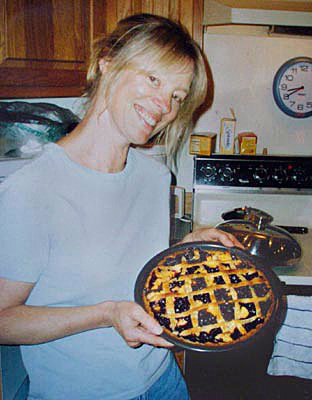
Pie from my Union blueberries.
Summers on the farm meant no school, a lot of reading and swimming, and on many days, a typed chore list from my mother. Whatever was on that list had to be done before we go down to the lake and swim. I guess from her point of view, it was a great way to get things done and keep her three children occupied. I certainly never considered that other children didn’t get those lists. It’s always a surprise when you leave home and learn about other people’s families and discover that their lives were radically different. Did the girls I met later in life iron all the sheets, table cloths, my father’s handkerchiefs and tee shirts? Did they pull an entire row of weeds in the hot summer sun? Did they have a chicken hospital where they tended to wounded chickens and nursed them back to healthy? Did their family have a white chicken named Asabanana who rode around on the back of a steer named Raisins? Probably not.
Summer nights were often spent preparing for “the long, cold winter.” Pitting cherries, snapping beans, shelling dried shell beans, making applesauce, canning pears or plums. When my parents’ friends were visiting from New York and New Jersey, they would join in, everyone sitting around a big table, hands busy, talking. When that was done, we’d clear away the food and play cards. I can’t remember the rules for Oh Hell, but I logged in many hours playing it.
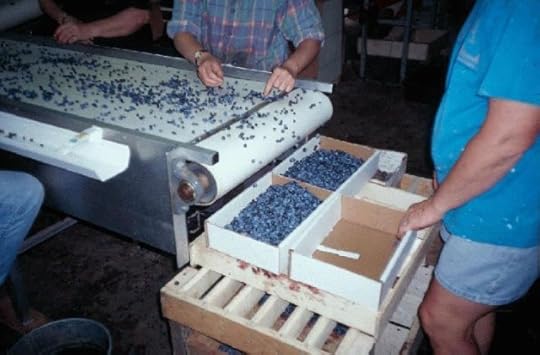
Blueberries coming off the belt
I doubt that many of the girls on my floor my freshman year at Jackson (Tufts) had raked blueberries or worked in the blueberry processing plant picking clods of dirt, spiders, leaves and other oddities out of the berries as they rolled past on a conveyer belt. It was the quintessential agricultural work: we stayed as long as there were berries to be processed, whether that was five or eight or one a.m. They probably hadn’t been a housekeeper at Whitehall Inn in Camden or worked one summer on Islesboro as a maid for an eccentric millionaire. That summer was quite the revelation about how the 1% lived. There was a cook and her assistant, a captain to manage the boats, the nanny who had little to do looking after indulged fourteen year old twins, and three of us local girls hired for the summer.
Every night, the beds had to be turned down, and we had to carry an iron to ensure that the folded down sheet was perfectly smooth. In a pocket, we’d carry cans of Brasso and cleaning rags because the doorknobs and other fixtures in the house were brass, and quickly tarnished by the sea air. The three of us had uniforms. In the daytime, stretch jeans and burgundy sweatshirts. In the afternoons, Lacoste dresses. In the evening, if there were guests and we were serving, strange hippy dresses that our boss had sourced from some hippie seamstress in Camden. There were several dogs underfoot that were not housebroken, so that while we prowled around with our Brasso, polishing up the fixtures, we also patrolled the floors in case one of the animals had had an accident. Accidents were very common!
Wow! I didn’t expect to be taking this trip down memory lane. But there it is. Working since the age of thirteen, and lucky enough to have grown up on a hill, beside a lake, in a small town where everyone knew each other. And had secrets. And gossiped. And gave me a lot of fodder to become a writer.
Lea Wait's Blog
- Lea Wait's profile
- 507 followers






